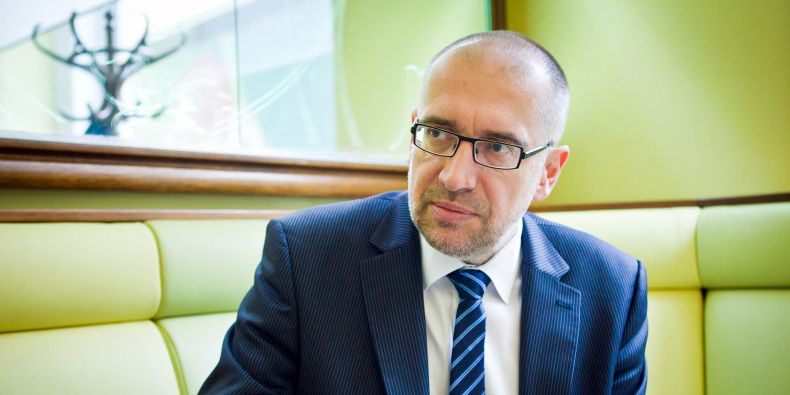Only one candidate was nominated to become the rector of the Masaryk University during the four-year-long term of office starting on September 1, 2015. The current rector Mikuláš Bek applied for re-election after gaining support of all deans and the Academic Senate MU voted him during its session in the Faculty of Law Auditorium on April 20.
You want to move MU higher up in the world university ranking from the six hundreds to the five hundreds. How do you want to achieve this?
Of course, I am aware that moving up in these prestigious university rankings depends only partially on our university, and partially it also depends on our competition which is more and more fierce. The move up in the ranking is however a strategic goal that can be very explicitly “translated" into a whole range of component university policies or measures. For example it is necessary to further decrease the number of students per each teacher, to internationalize the academic teaching personnel and to improve publishing output measured by international databases. The goal referred to as a climb in rankings is hence a good umbrella term for a whole range of useful and sensible sub-steps. Naturally we cannot be sure that we will really make it to the five hundreds, since it is not only in our hands. But the measurable differences between universities in the zone of "aspirants" are slight, and in four years, more than one would guess can be achieved, provided there is an internal consensus about it.
The Amendment of the University Act should become effective this year already. What will it mean for the University in practice?
If the amendment is adopted, the university will above all have the opportunity to acquire a greater autonomy in the area of study. It could seek to obtain the so called institutional accreditation and create and modify study programs in certain areas of education independently. We are very well prepared for this development. For years, we have been developing tools of internal evaluation of subjects of study which is an important part of the future “system of quality assurance". We have also made progress in preparing the relevant internal legislation. Many Czech universities have approached us during the past few month asking for advice or if we could share our experience and tools. Besides, we also had to adopt a new university status, since the amendment assumes some changes in authorities of university bodies, but this did not mean any revolution.
You emphasize interdepartmental cooperation and support for scientist and scholar applying for demanding international grants. What will this look like?
In the area of research, high level of decentralization of authorities and responsibilities is necessary at universities. Individual scientific disciplines and research teams should have a wide domain for their own initiative, even if in the area of research infrastructure cooperation is necessary. At the university level, cooperation between disciplines, faculties and university parts is the main sphere of activity of university administration. Hence we are using only a small part of institutional support for backing interdisciplinary projects. I would like to see ourselves continuing such support, improving it and thus using the potential that lies in the cooperation of scientist across institutes and faculties. It makes sense to provide support for acquisition of demanding international grants on university level, because our scientists are not submitting hundreds of these every year, but rather dozens or even less. To prepare such grant applications, expertise and experience are necessary and it is economically not “worth" building such background at each individual faculty or institute. This concerns for example some types of projects for Horizon 2020, ERC grants or ERA Chair.
Rumor has it that the times of plenty are over at the university. What will it mean in reality?
There is no need to panic, but we should also have no illusions. Next year resources for educational activities of the university will be, at best, stagnating. While the science budget is increasing, the number of people supported from it in new research centers has also been rising in recent years. We were also used to utilizing resources from two operational programs (OP VK and OP VaVpI). They will now be replaced by only one program with half the volume of funds and Prague will now be an equal region for receiving funds from the program as well. Hence in my estimation, only about a fourth of the money used from structural funds in 2013 or 2014 will be available. I expect that the so far rather steep growth of average wages will halt. What effects the new budget situation will have on specific workplaces depends mainly on management of individual faculties, because according to the University Act, personnel policies are mainly in hands of individual deans. Although in recent years, when the overall budget of the university has been growing, central expenses of the university have been stagnating, it is clear that now we will have to find ways to save even in this area.
In your program, you mention completing the university infrastructure. What are the closest goals?
In this area, I see two priorities for the structural funds. Firstly, it is competing the campus by adding premises for the simulation center, stomatology and paramedical subjects of the Faculty of Medicine. Then it is finishing the Faculty of Informatics and the Institute of Computer Science on Botanická. It is still left to finish the reconstruction of the Faculty of Arts with support of a national investment program.
